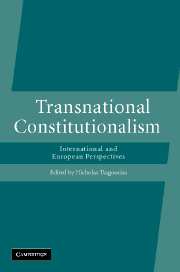Book contents
- Frontmatter
- Contents
- List of contributors
- Foreword by Malcolm D. Evans
- List of abbreviations
- Introduction – Constitutionalism: a theoretical roadmap
- Part I States, courts and constitutional principles
- 1 The rejection of the universal state
- 2 The standing of states in the European Union
- 3 The constitutional role of general principles of law in international and European jurisprudence
- 4 Proportionality and discretion in international and European law
- Part II Transnational constitutional interface
- Part III Visions of international constitutionalism
- Index
1 - The rejection of the universal state
Published online by Cambridge University Press: 01 July 2009
- Frontmatter
- Contents
- List of contributors
- Foreword by Malcolm D. Evans
- List of abbreviations
- Introduction – Constitutionalism: a theoretical roadmap
- Part I States, courts and constitutional principles
- 1 The rejection of the universal state
- 2 The standing of states in the European Union
- 3 The constitutional role of general principles of law in international and European jurisprudence
- 4 Proportionality and discretion in international and European law
- Part II Transnational constitutional interface
- Part III Visions of international constitutionalism
- Index
Summary
Introduction
Three concepts have central roles in describing, explaining or legitimising the legal orders which have come to regulate our social lives. These concepts, which are consent, obligation and institutional form, are mutually supportive and logically parasitic upon each other. This is as true for the social contractarian tradition in political philosophy as it is for modern international legal scholarship. For example, for social contractarians the idea of rational consent by natural agents (i.e. human beings) justifies certain political and legal institutional forms. In the same way, international lawyers argue that the consent of artificially constructed agents (i.e. states) gives rise to legal obligations and legal institutions which regulate international relations. In the former tradition, the state is the justified institutional form. But both traditions shy away from arguing for some analogue to what Kant called a ‘universal cosmopolitan state’ or what Hobbes might have called a ‘global leviathan’ and instead argue for some alternative. The familiar, decentralised and horizontal conception of international law is but one example of these alternatives. This chapter examines the reasons why the logic which provides the normative justification for the state does not do the same to justify some form of universal state.
By rejecting a universal state, most social contractarians and international lawyers adopt what might be called a discontinuity thesis. This thesis can be explained in the following way. As has been suggested, the consent of natural agents has a normativising effect. Consent transforms stipulated norms into legal obligations.
- Type
- Chapter
- Information
- Transnational ConstitutionalismInternational and European Perspectives, pp. 17 - 43Publisher: Cambridge University PressPrint publication year: 2007
- 2
- Cited by

